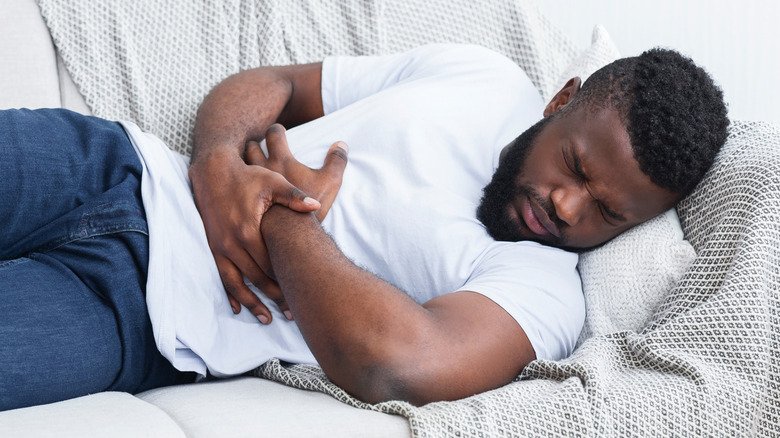The Unexpected Way Your Appetite Might Change When You're Attracted To Someone
There's nothing quite like meeting someone that finally gives you the butterflies you deserve. It's an amazing feeling, especially when you're knee-deep in the first two of the three stages of falling in love: lust and attraction, respectively. Your mind and body are basically going nuts and no amount of trying to rein in those emotions and obsessive thoughts is going to work. You're officially smitten.
Although there are many ways that attraction can affect the mind and body, one of the most common — and hard to ignore — is its impact on appetite. While it might be easy to chalk it up to adjusting to new feelings, it's a bit more complicated than that. In 2019, world-renowned biological anthropologist and expert on love and attraction, Dr. Helen Fisher, told BrainWorld Magazine about a study that she and her team conducted. They took people who were, to use her words, "madly in love," and put them in a scanner to monitor what parts of the brain were affected most. One of the big takeaways was finding that dopamine is produced very close to the hypothalamus, which is in control of regulating thirst and hunger.
"Thirst and hunger keep you alive, and romantic love allows you to send your DNA into tomorrow," Dr. Fisher told the magazine. "So in the end, love is a survival mechanism." In other words, it makes perfect sense that the hormones at play affect what it takes for humans to survive, and appetite is one of those things. But what the brain scan found isn't the only reason your appetite might be all over the place when you're attracted to someone.
Cortisol could be making you feel sick
As much as butterflies feel fun and exciting when you're attracted to someone, especially if it's new, there can still be some stress in there. In fact, it can give anyone's mental health a run for its money because, according to 2015 research published by Harvard Medical School, cortisol levels increase in the early stages of falling in love and being attracted to someone. This happens as a way to try to handle everything — the "crisis," as the researchers labeled it — that's going on in the mind and body. As the cortisol increases, levels of serotonin drop, which further affects feelings of anxiety and stress.
"Lovesickness may actually be the stress hormone cortisol contracting the blood vessels in your stomach, making you feel sick," clinical sexologist and licensed marriage and family therapist Kat Van Kirk, PhD, told CNN. It's during this time that even the desire for a food as perfect as pizza can go out the window, just as it would in any other stressful periods in life. But don't worry; the stressed-out stomach will pass and nothing will stand in the way of loving pizza again — just as much as you love your partner.
Your priorities shift
As much as cortisol may be doing number on your gut, making the need for food near-obsolete, we can thank the other hormones that come with being attracted to someone for also contributing to our appetite, or lack thereof. "Oxytocin releases dopamine, dopamine makes us release endorphins, and those endorphins make us feel good," psychiatrist Lamont Moss, MD, tells SELF. So good, in fact, that a 2017 study published in Philosophy, Psychiatry, & Psychology compared love's impact on the brain as being the same as cocaine – one of several studies that have found the same.
"Dopamine can motivate us to do certain things," Moss told SELF. This is the reason why it's easy to stay up until dawn talking to the person you're attracted to or be willing to take risks that you wouldn't have taken in the past. While all these things are happening, eating takes a backseat because you have a new priority: that special person. When you find yourself falling in love, everything becomes secondary. But just as the stress eventually passes, so does the fixation, and you wake up one day realizing you haven't eaten in days and you're famished.
When you become attracted to someone, it's best if you just expect everything you've ever known to go absolutely haywire — and not just your appetite. Although they say no two loves are the same, that doesn't mean you get to dodge all the hormonal mayhem every time someone new comes your way. If hormones didn't drive us a bit crazy every time we fell for someone, we'd be missing out on half (if not most) of the fun.



